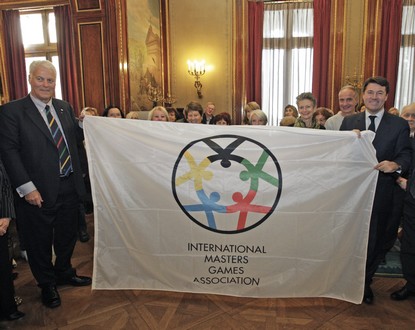Kaï Holm, President of the IMGA (International Masters Games Association) officially presented the official flag of the European Masters Games to Christian Estrosi, Deputy Mayor of Nice, President of Nice Côte d’Azur, and Jean-Michel Galy, Municipal Councilor Delegated to Senior Citizenship and Social Aid.
In September last year, the IMGA (International Masters Games Association) designated the city of Nice as the host for the 2015 edition of the European Masters Games. Nice is the first city in France to host this major popular sporting event.
“This competition is part of the sport-tourism-economy trio, which allows sport to be linked to economic activity and to have spin-offs in terms of reputation,” explains Christian Estrosi.
Concluding, addressing President Holm: “We will not disappoint you, we will rise to the occasion.”
The IMGA (International Masters Games Association)
The IMGA is a non-profit association based in Lausanne, recognized by the International Olympic Committee. It is presided over by the Dane Käi Holm, a former member of the I.O.C, and his son, Jens Holm, has been the general manager since 2006.
For more than 20 years, the IMGA has organized the World Masters Games, with the last edition taking place in Sydney in 2009. It was a massive success with over:
– 33,000 participants, including 28,500 competitors;
– €45 million spent by visitors over two weeks.
Recently, the IMGA launched the European Masters Games, with the 2011 edition held last September in Lignano, Italy.
The European Masters Games is a competition intended for a very wide population (spry centenarians can participate!), but more specifically for the so-called “veteran” athletes of each concerned discipline.
Participants come from all over the world. They are responsible for their registration with the organizing committee as well as their accommodation and catering expenses.
Between 15,000 and 20,000 visitors will be welcomed under the best conditions across the 15 designated sites, especially since Nice will have gained experience from organizing the Francophonie Games in September 2013.
The event’s budget will be 4 million euros, of which 2 million will be borne by the participants themselves, while the city of Nice will contribute 500,000 euros.
The expected economic impact, primarily for the restaurant and hotel sectors, will be 40 million euros.
The selection of Nice for the organization of the European Masters Games in 2015 strengthens the city’s intention to pursue a dynamic policy in favor of the 100,000 seniors in Nice.


